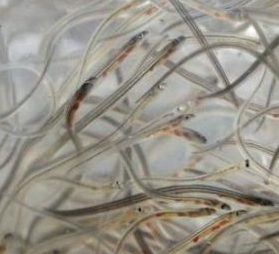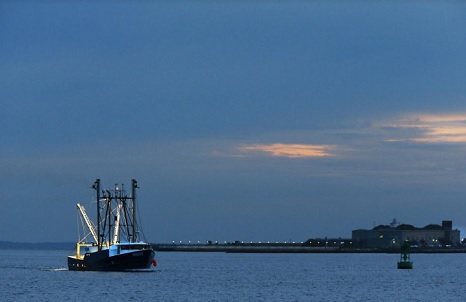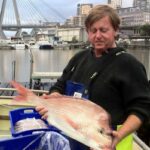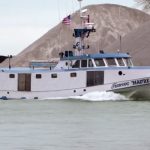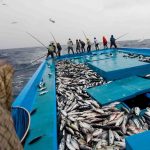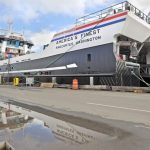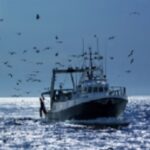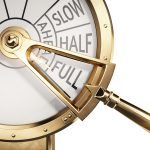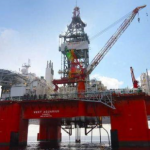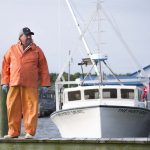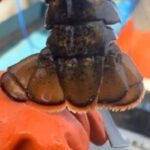Monthly Archives: May 2018
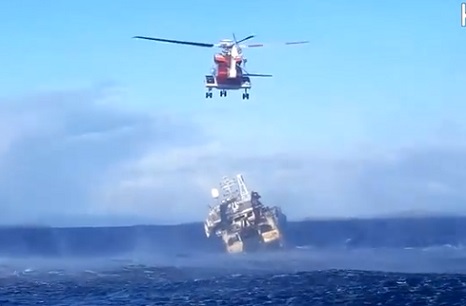
Crew of sunken ‘Ocean Way’ was unprepared for emergency
On the morning of 3 March 2017, the twin-rigged trawler Ocean Way foundered 18 nautical miles north-east of Lerwick, Scotland, after suffering a flood in its aft compartment/accommodation space. The flood was almost certainly the result of hull damage caused when the port trawl door struck the hull during recovery of the gear. Despite the crew’s efforts to bring the flooding under control using fixed and portable pumps, the ingress of water exceeded the pumping effort and Ocean Way succumbed to overwhelming down flooding when the open accommodation space escape hatch submerged. >click to read<12:37
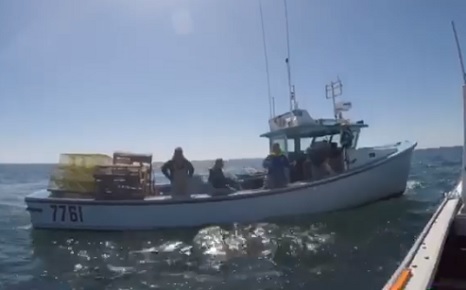
Turf War: Eastern Shore lobster fishermen say vandalism, threats continuing
Jason Keating had a buoy on the hauler Saturday morning when another lobster boat steamed slowly by with eight people aboard. “You move your (expletive) gear right now you (expletive),” was shouted at him, among other things, from Colin McKay’s passing cape islander. Keating recorded the interaction with a video camera he’d purchased the night before. In fact at least four of Little Harbour’s eleven fishermen have begun carrying video cameras to record their interactions on the water with McKay. “I bought the camera to protect myself,” said Keating. Graphic Video, >click to read<10:31

Maryland congressman seeks reassurance on impact of offshore wind
An amendment to legislation has been passed that requests the National Oceanic and Atmospheric Administration to study the effects of offshore wind projects on wildlife offshore Maryland.
The House Committee on Appropriations marked up the FY19 Commerce, Justice and Science Appropriations bill earlier in May. Congressman Andy Harris authored, and the committee passed, an amendment ordering the National Oceanic and Atmospheric Administration (NOAA) “to study the effects of offshore wind projects on marine mammals and fish, as well as the need for any mitigation measures.” >click to read<09:30

‘Deadliest Catch’ star pleads guilty to misdemeanor assault
Celebrity crab-boat captain Sig Hansen has pleaded guilty to a misdemeanor charge that he spat on an Uber driver last year in Seattle. The Seattle Times reports the 52-year-old “Deadliest Catch” star pleaded guilty Wednesday. Under the plea deal, a property destruction charge was dismissed. Prosecutors also recommended the assault conviction be dropped and the case dismissed if Hansen complies with court conditions for a year. But Judge Edward McKenna wasn’t ready to agree with that recommendation. He postponed sentencing and ordered Hansen to undergo a new alcohol evaluation. >click to read<19:52

P.E.I.: North Lake fishermen offer $10K fishermen offer $10K reward on lost traps
Fishermen in North Lake, P.E.I., are offering a $10,000 reward in the hope that it will elicit tips from the public regarding 240 traps lost earlier this month. According to RCMP, sometime between noon on Saturday, May 12, and the early morning on Monday, May 14, lines on the 240 traps were cut. Police estimate the traps were worth about $31,000. >click to read<18:49
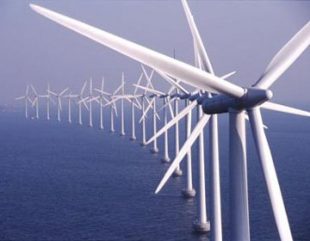
Two big wind farms to rise off coast of Martha’s Vineyard
State officials and utility executives Wednesday picked the first company to build a wind farm off the coast of Massachusetts, a project with as many as 100 turbines 15 miles south of Martha’s Vineyard. Vineyard Wind, a joint venture of New England utility Avangrid and Copenhagen Infrastructure Partners, beat out a proposal from Bay State Wind, a joint venture owned by Eversource Energy and Danish energy giant Orsted. Meanwhile, the Deepwater project will be known as Revolution Wind and is about 12 miles south of the Vineyard. It would be 10 times the size of Deepwater’s five-turbine project off Block Island, >click to read< 16:50
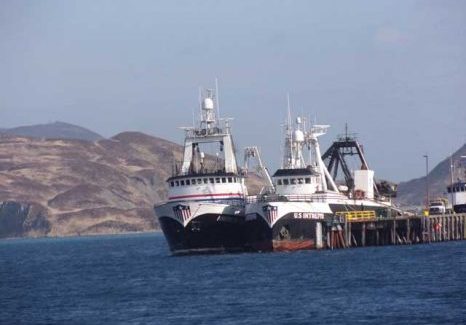
Fight over America’s Finest vessel part of bigger processor battle
The mothershippers are fighting with the groundfish shoreplants in a politicized Bering Sea commercial fishing tussle reaching all the way to Washington, D.C. The battle over Pacific cod pits the factory trawlers of the Amendment 80 fleet against Alaska shoreplants and local governments. And in February, it pitted two local governments against each other. A delegation of municipal and business leaders from Anacortes, Wash., traveled to the Aleutian Islands to ask the Unalaska City Council to reverse itself but didn’t change anybody’s mind. The brand spanking new factory trawler America’s Finest remains stranded in an Anacortes, Wash., shipyard, unable to fish in the United States because it hasn’t received a waiver from the Jones Act. >click to read<15:54
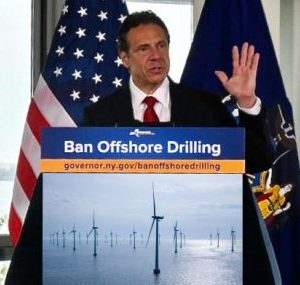
NY Dems’ Anti-Energy Policies Forced New Yorkers To Pay 46 Times More For Power
Natural gas prices in the New York City region skyrocketed in January, costing New Yorkers roughly 46 times more than the 2017 average for the area, according to a Tuesday report from the Consumer Energy Alliance (CEA). Despite neighboring natural gas-rich Pennsylvania, New York residents pay 44 percent more for energy than the national average. A lack of transportation infrastructure between the two states has effectively cut off New Yorkers from a large supply of fuel. (because we’re gonna have wind farms!) Due largely to a lack of oil and gas infrastructure, much of New England was forced to rely on imported natural gas from Russia to keep neighborhoods heated during over the winter. >click to read<14:20
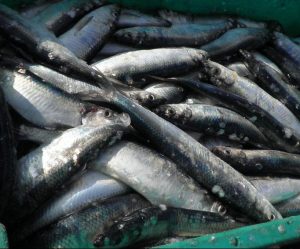
New England: Members Of Commercial Fishing Industry Oppose Proposed Changes To Herring Fishery
Commercial fishing companies are against proposed changes to the Atlantic herring fishery management plan. The New England Fisheries Management Council wants to establish a new process for setting the sustainable harvest limit, referred to as the “acceptable biological catch.” That control rule, which is set every three years, would be in place for a longer period of time. The Town Dock, a Rhode Island-based seafood dealer and processor, said in a statement changing that rule would be problematic for the fishery. >click to read<13:50
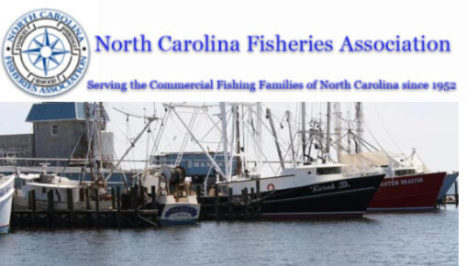
Nearly 200 NC Fishermen Travel To Raleigh For Second Annual Seafood Lobby Day
Today, commercial fishermen will forego a day working on the water and instead work the halls of the Legislative Building for the 2nd Annual Seafood Lobby Day. The event, coordinated by North Carolina Fisheries Association (NCFA), provides an opportunity for legislators to meet the individuals that provide fresh, NC-caught seafood to their communities across the state and to hear directly from commercial fishermen about the challenges they face. Nearly 200 fishermen from up and down the coast traveled to Raleigh for the event. >click to read<12:34
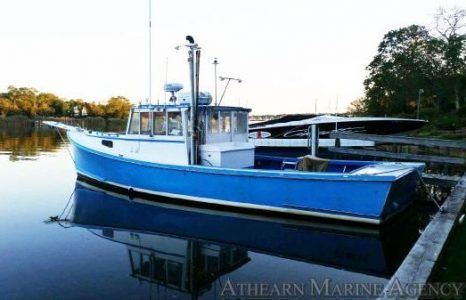
Athearn Marine Agency Boat of the Week: 37′ Repco Lobster/Tuna, 300HP, 6 Cylinder John Deere, price reduced!
Specifications, information and 5 photos >click here< To see all the boats in this series, >Click here<12:03
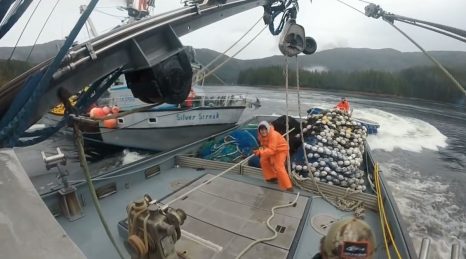
Rammed or shooting the gap? Salmon seiners clash in Prince William Sound criminal case
An unusual criminal case in Cordova that centers on a violent fishing boat collision two years ago is expected to wrap up without jail time. The June 2016 crash between seiners in a Prince William Sound cove near Whittier revealed a dark side of Alaska’s multimillion-dollar pink salmon fishery. Kami Cabana, the 25-year-old third-generation fisherman at the helm of the Chugach Pearl, faced first-degree felony assault charges for what prosecutors called an intentional ramming. Her attorney argued it was Jason Long, the Cordova-based skipper of the Temptation, who was actually at fault: He tried to force his way through a lineup of boats with a dangerous maneuver. Video, >click to read< 11:08
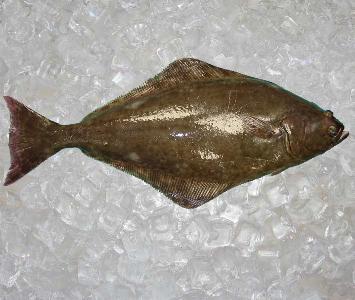
Maine: New halibut rules aim to keep fishery open
The Maine Department of Marine Resources has reminded harvesters with an Atlantic halibut endorsement of new state regulations designed to keep the state compliant with federal rules. The new state rules, enacted in April as emergency regulations and scheduled to become permanent in June, are designed to prevent state licensed harvesters from exceeding the allowable catch limit in state waters and contributing to an overage for the combined state and federal fishery. >click to read<10:26
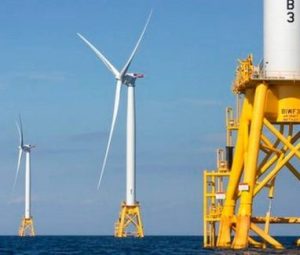
Offshore Wind: Deepwater In Too Deep?
It looked so good at first blush. It checked all the hot boxes — Green. Alternate Energy. Zero carbon footprint. We would end our dependence on fossil fuel, the developers promised. But when folks in East Hampton started taking a closer look at a proposed Deepwater Wind project off the coast of Montauk, the negatives began outweighing the positives for a lot of people who felt they would be adversely affected, especially those in the fishing community. The erosion of support occurred gradually. During the election, the victorious Democratic candidates favored the development of the wind farm though the Republican challengers didn’t. But recreational and commercial fishermen, some armed with data from wind farms in Europe, reported that the wind turbines are detrimental to fish and fatal to migratory birds. >click to read<09:20

Coast Guard monitors efforts to confirm location of sunken vessel in Willapa Bay
Coast Guard personnel continue to monitor the response to the report of the overdue fishing vessel Kelli J after a boat crew contracted through the vessel owner’s insurance company located a large unknown object in the area of a previously sighted pollution and debris in the water of Willapa Bay, Tuesday. Global Diving and Salvage personnel have been contracted by the insurance company to dive on and identify the object Wednesday, and assess what actions can be taken for potential salvage. Around 3:35 p.m. on Saturday, watchstanders at Coast Guard Sector Columbia River received a report that the operator of the Kelli J was overdue from a fishing trip. The report came from the vessel operator’s wife, who stated he was due to return at 12:30 p.m. that day and confirmed his vehicle was still at a Nahcotta marina with no vessel in sight. >click to read<23:39
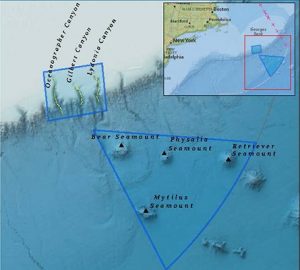
If courts are ever going to strike down an illegal national monument, this’ll be it
Often, it seems the federal government has it out for the English language. The President and federal agencies routinely twist the words in statutes beyond recognition. For instance, PLF has long challenged EPA’s bizarre claim that dry land is “water” under the Clean Water Act. The government’s no fan of consistency, so it should come as little surprise that the President also claims the ocean is “land” when that suits his purposes. In Massachusetts Lobstermen’s Association, et al. v. Ross, PLF is challenging the designation of 5,000 square miles of ocean as the Northeast Canyons and Seamounts Marine National Monument, under a statute that expressly limits designations to “land owned or controlled by the Federal Government.” The government has moved to dismiss that case arguing that the President can essentially do whatever he wants, the language of the statute be damned. Today, we filed our response to that motion. In our brief we explain that: Pacific Legal Foundation >click to read<21:52
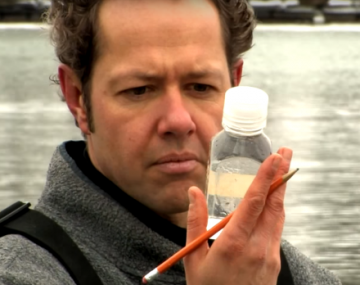
WWF Warns All Fish May Go Extinct Within Next 30 Years
In a world where the global population is close to 7.5 billion people, you can expect that the demand for food is similarly climbing at an exponential rate. The more people there, the more mouths there are to feed. One of the industries that is suffering from this increase in demand for food is the fishing industry – and in return, people are turning towards unsustainable fishing methods. The WWF warns us of a looming collapse of the ocean’s various ecosystems in the next thirty years if this kind of dangerous fishing practices continue. In a 2006 study published by Worm, et. al., >click to read<16:23
November 2, 2006 – Seafood May Be Gone by 2048, Study Says – >click to read< From FishnetUSA – This was the Pew produced headline that got extensive media play starting in November of 2006. “Unless humans act now, seafood may disappear by 2048, concludes the lead author of a new study that paints a grim picture for ocean and human health.,, >click to read<
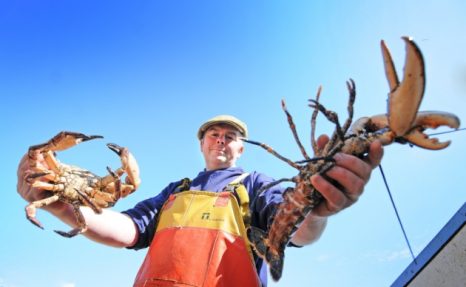
Fishermen assure crab consumers that stock downturn is “nothing to worry about”
The Beast of the East saw thousands of shellfish washed up along the East of England coastline, but wreaked havoc on the sea floor as well. As well as this, due to an uncharacteristically cold winter, the crabbing season started later than usual. “I’d say we’re catching about 60% of what we’re usually catching,” said Wells crabber Andy Frary. “There’s a number of factors which could contribute to this.,, Shellfish including crabs were reported to have been washed up all along the north Norfolk coastline following the February storms, in places such as Cromer, Sheringham and Wells-next-the-Sea. >click to read<14:04
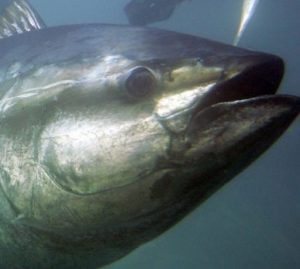
Con groups disagree with NOAA decision to remove Western Atlantic bluefin from overfished list
The decision by NOAA Fisheries to remove Western Atlantic bluefin tuna is not sitting well with conservationists. Last week, the agency released its Status of U.S. Fisheries report for 2017. In it, officials announced that the number of stocks on the overfished list had dropped to 35, an all-time low. The Western Atlantic bluefin was among six stocks removed from the overfished list. NOAA, in a press release, said “significant scientific uncertainty” about the stock after last year’s assessment led to the ruling. >click to read<13:29
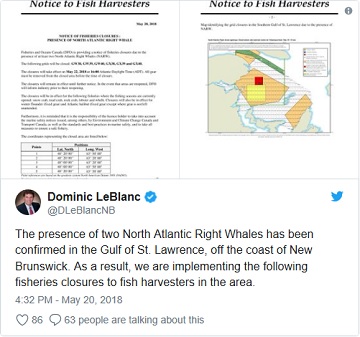
Fishermen’s frustration grows as reality of protecting whales sinks in
The president of the Maritime Fishermen’s Union says there is “increasing frustration” among his members after a new temporary closure of an area east of Miscou Island on the northern coast of New Brunswick. The decision by the Department of Fisheries and Oceans comes after a surveillance flight spotted two North Atlantic right whales swimming in the area. Fishermen have until Tuesday at 4 p.m. to remove all of their gear during the 15-day closure, which could be extended if whales remain in the area. Carl Allen said those who have been fishing in the area that will be closed are in a “severe panic.” >click to read<12:26
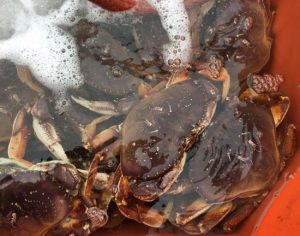
Local fisherman takes advantage of being able to sell crab on Kodiak docks
Fresh seafood seems like it’d be an easy thing to get in a fishing town like Kodiak. But it wasn’t until recently that it was legal for fishermen to sell what they’ve caught right off their boats on local docks.,, Brian Blondin is holding a Dungeness crab and pinching its shell to see if its ready to eat. “You always gotta feel make sure the shells are hard.” He’s one of the first people to take advantage of the City of Kodiak allowing fisherman to sell what they’ve caught on its docks, which has only been legal since late last year. >click to read<10:54
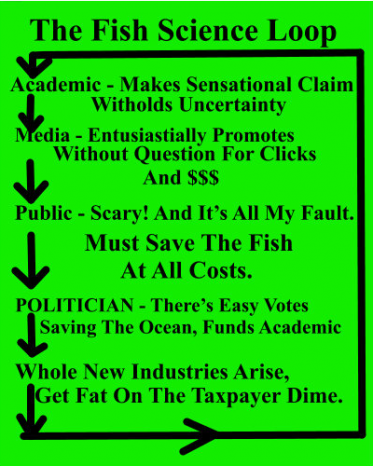
Lost Crab Pots: Not as Bad as We Thought?
Back in 2016, a team of scientists from the Virginia Institute of Marine Science said watermen lost an astounding number—145,000 crab pots, leading to the deaths of millions of dollars’ worth of crabs trapped in those pots. But a different panel of scientists says it’s not as bad as they originally thought. Glenn Davis, who chairs the Chesapeake Bay Stock Assessment Committee, told a winter meeting of fisheries managers that the VIMS numbers are wrong.,,, But once the VIMS study was out there, it was hard to take back. And sure enough, somebody tried to monetize it.>click to read<09:05
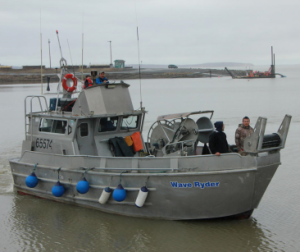
Togiak sac roe herring’s lone gillnetter calls it a season
Seagulls wheeled under gray skies, and low clouds spit rain as the F/V Wave Ryder motored back into Dillingham after nearly four weeks on the water near Togiak. The purse seine fleet took its quota by May 2, leaving Frank Woods and his crew on their own to fish for the 7,212 tons of herring allocated to gillnetters. On Thursday, he ended his season. The mood on the 32-foot aluminum drift boat was celebratory as it was hauled out and put up in the Peter Pan Seafoods boat yard. Audio, >click to read<22:10

Federal carbon tax could ‘degrade’ Canadian fishing industry’s competitiveness
The federal government’s carbon tax could take a toll on Canada’s fishing industry, causing its competitiveness to “degrade relative to other nations,” according to an analysis from the fisheries department.,, According to the analysis, the fishing sector would need to absorb annual fuel cost increases of 2.1 per cent, or $5.2 million, under a carbon price that increases by $10 per tonne annually to $50 per tonne in 2022. The commercial fishing sector would be hardest hit, it finds, as fuel costs account for more than nine per cent of production costs. >click to read<

Alaskan fishermen aren’t the only ones noticing the rise of Atlantic halibut
As prices and demand for Pacific halibut have fallen in Alaska, commercial fishermen say a new Canadian competitor is to blame. Since 2012, Canadian imports of fresh Atlantic halibut have grown roughly 60 percent. Historically, Atlantic halibut has not competed with its close relative on the West Coast since New England and Canadian fishermen overfished stocks in the late 1880s. But as the catch continues to grow north of the border, fishermen in New England are working towards restarting a fishery in U.S. waters.,, “A lot of those boats are fishing on the U.S.-Canadian line and having very good results, and it’s been going on for a while,” Mike Russo said, a New England-based commercial fisherman. >click to read<16:03
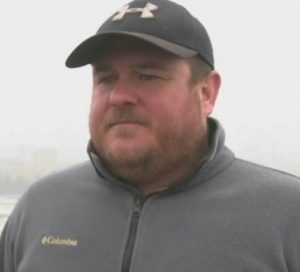
New Brunswick fishermen alarmed at 2nd closure over whale sighting
Fishermen are alarmed over the closure of another fishing area in order to protect North Atlantic right whales, a move some say will have a drastic effect on the industry. Fisheries and Oceans Canada announced Sunday that a second area off the coast of northern New Brunswick was being closed to fishing for at least two weeks. “We’re behind on our annual catches right now,” said Steven Hughes, a deckhand on a snow crab fishing boat based out of Shippagan. “This brought back the stress on the fishing industry.” >click to read< 15:15
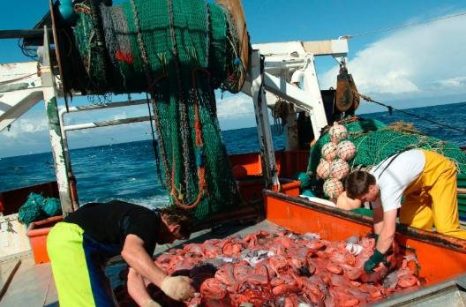
Bottom trawling for orange roughy has scientists worried
Three of the nine fisheries within New Zealand waters were recently deemed sustainable once again. But it is bottom-trawling for orange roughy on the high seas – the area out beyond the 12 nautical mile limit of New Zealand and Australia’s exclusive economic zone – that has scientists and conservationists worried.,, Experts call them “vulnerable marine eco-systems” (VMEs) but some in the fishing industry even object to the term as “unscientific and akin to labelling fishermen as murderers”. These tensions led to protracted wrangling about how best to protect the South Pacific’s orange roughy and that has now culminated in threats of legal action from New Zealand’s powerful fishing industry interests. >click to read<13:45

The High-Stakes Battle Over Obama’s Atlantic Ocean National Monument
Mining and drilling for oil are already banned in the Northeast Canyons and Seamounts Marine National Monument, established by former president Barack Obama in 2016 as the first marine monument in the Atlantic Ocean, 150 miles off the coast of Cape Cod. Within five years, too, all commercial fishing will be phased out – or, at least that was the plan. A federal judge is now weighing the fate of those protections in a lawsuit originally filed in March 2017 by a coalition of New England fishing groups – and it has led to a rare case of President Donald Trump defending his predecessor’s authority. >click to read<10:27






